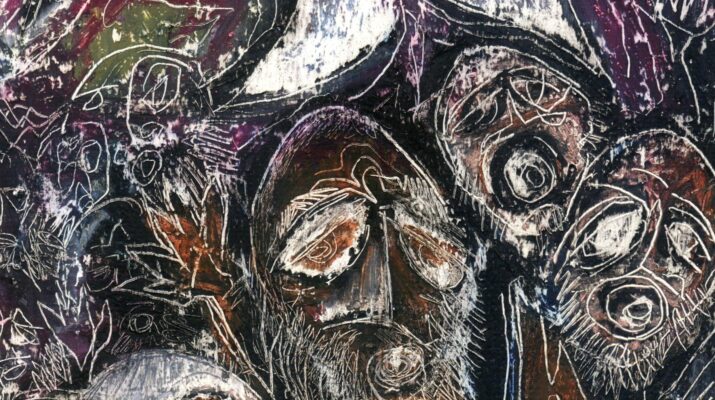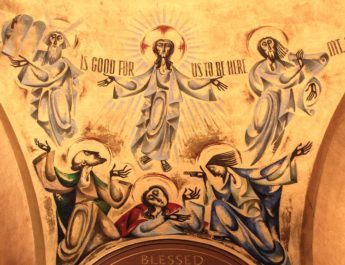Mark 13:9-11
NL 242
9 “As for yourselves, beware,A for they will hand you overB to councils,C
A “beware” = blepo. This is literally to see – it is primarily used in the physical sense. However, figuratively it can be seeing, which includes attention and so to watchfulness, being observant, perceiving, and acting on the visual information. It can also mean beware.
B “hand…over” = paradidomi. From para (from beside, by) + didomi (give, offer, place, bestow, deliver; give in a literal or figurative sense). This is literally to hand over – hence to deliver, abandon, or betray. It implies a personal involvement.
C “councils” = sunedrion. From sun (with, together with) + hedra (convening, siting together, being firm and faithful); {from aphedron (seat, well-seated; figuratively, this is firm in purpose, steadfast); from hedra (a seat)}. This is Sanhedrin – literally a sitting together. It was the high court for Jews and had 71 members. This term could also mean council or meeting place and was used for the lower courts that were throughout the land and had 23 members.
and you will be beatenD in synagogues,E and you will standF
D “beaten” = dero. 15x in NT. To whip, flog, scourge, beat, thrash.
E “synagogues” = sunagoge. From sun (with, together with, closely associated) + ago (to lead, bring, carry, guide, go, drive). Literally, this is a bringing together, a place of assembly. The term can be used for the people or for the place where they assemble. It is also sometimes used of Christian churches in the New Testament. So, this is synagogue, assembly, congregation, or church. This is where the word “synagogue” comes from.
F “stand” = histemi. This is to stand, place, establish, appoint, stand ready, be steadfast.
before governorsG and kingsH because of me, as a testimonyI to them.
G “governors” = hegemon. Related to “synagogues” in v9. From hegeaomai (to think, suppose, have an opinion; to lead the way, what comes in front or first, initial thought, high esteem or authority; one who commands in an official capacity); from ago (see note E above). This is a leader in general, but also specifically a governor or commander. This is where “hegemony” comes from.
H “kings” = basileus. Probably from basis (step, hence foot; a pace); from baino (to walk, to go). This is king, emperor, or sovereign.
I “testimony” = marturion. 19x in NT. From martus (a witness whether having heard or seen something; witness literally, judicially, or figuratively; by analogy, a martyr). This is something that counts as evidence whether a witness, testimony, or other proof.
10 And the good newsJ mustK firstL
J “good news” = euaggelion. Related to “synagogues” and “governors” in v9. From eu (well, good, rightly) + aggelos (angel, messenger; a messenger from God bringing news – whether a prophet or an angel); {from aggellos (to bring tidings); probably from ago (see note E above)}. This is literally “the good news,” used for the gospel. This is also where “evangelism” comes from.
K “must” = dei. From deo (to tie, bind, compel; declare unlawful). This is what is necessary or proper. It is what is needed or what one should do – a duty or something inevitable. This refers to something absolutely necessary.
L “first” = proton. From protos (what is first, which could be the most important, the first in order, the main one, the chief); from pro (before, first, in front of, earlier). This is firstly, before, in the beginning, formerly.
be proclaimedM to allN nations.O
M “proclaimed” = kerusso. This is to proclaim, preach, publish. Properly, it is to act as a herald – announcing something publicly with confidence and/or to persuade.
N “all” = pas. This is all or every.
O “nations” = ethnos. Probably from etho (a custom or culture). This is people who are united by having similar customs or culture. Generally, it is used to refer to Gentiles. This is a tribe, race, nation, or Gentiles in general. This is where the term “ethnicity” comes from.
11 When they bringP you to trial and hand you over, do not worry beforehandQ about what you are to say,R but say whatever is givenS you at that time,T
P “bring” = ago. Related to “synagogues” and “governors” in v9 & “good news” in v10. See note E above.
Q “worry beforehand” = promerimnao. 1x in NT. From pro (before, first, in front of, earlier) + merimnao (to be anxious, distracted, or care for. It is being pulled in different directions – usually a negative); {from merimna (care, worry, anxiety; being separated from the whole); from merizo (to divide, part, share, distribute, assign; figuratively, to differ); from meros (part, share, portion figurative or literal); from meiromai (to get your share, receive one’s allotment)}. This is to worry or ponder ahead of time.
R “say” = laleo. From lalos (talkative). This is to talk, say, or preach.
S “given” = didomi. Related to “hand…over” in v9. See note B above.
T “time” = hora. This is a set time or period, an hour, instant, or season. This is where the word “hour” comes from.
for it isU not you who speakV but the HolyW Spirit.X
U “is” = eimi. This is to be, exist.
V “speak” = laleo. Same as “say” in v11. See note R above.
W “Holy” = Hagios. From hagnos (holy, sacred, pure ethically, ritually, or ceremonially; prepared for worship, chaste, unadulterated, pure to the core; undefiled by sin; figurative for innocent, modest, perfect). God is totally different from humanity and thus set apart. That which is consecrated to worship God (elements of worship) or to serve God (as the saints) are holy because they are now set apart for God’s purposes. Holy because important to God. This is sacred physically, pure. It can be morally blameless or ceremonially consecrated.
X “Spirit” = Pneuma. From pneo (to blow, breathe, breathe hard). This is wind, breath, or ghost. A breeze or a blast or air, a breath. Figuratively used for a spirit, the human soul or part of us that is rational. It is also used supernaturally for angels, demons, God, and the Holy Spirit. This is where pneumonia comes from.
Image credit: “Khi” by Syed Ali Wasif, 2013.




